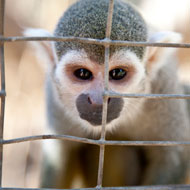
Chinese Year of the Monkey reiterates calls to end the primate pet trade
As China rings in the New Year of the Monkey, animal and veterinary organisations are reiterating their call for a ban on the keeping of primates as pets.
An estimated 5000 primates are kept as pet in the UK, including marmosets and squirrel monkeys. This is despite Defra’s view that the keeping of a primate in a domestic setting is an offence under the Animal Welfare Act.
The Year of the Monkey is thought to be one of the unluckiest years in the Chinese calendar. But now the BVA - along with a host of animal welfare organisations - will be taking every opportunity to ensure that 2016 is a lucky year for primates.
“Primates are long lived, intelligent and socially complex animals whose needs and welfare requirements are extraordinarily difficult to meet in captivity and when kept privately as pets,” said Sean Wensley, president of the BVA.
“For BVA, it would be fitting for governments to recognise and protect the wellbeing of monkeys during the Year of the Monkey and we will continue to call for change to protect the welfare of these intelligent animals by introducing a ban on the private pet-ownership and trade of primates.”
Many countries across Europe have already introduced a ban on the keeping of all or some species of primate as pets.
Recently Defra announced that it will review its Code of Practice for the Welfare of Privately Kept Non-Human Primates in 2016.
The coalition - which includes the RSPCA, the Born Free Foundation, Captive Animals’ Protection Society, Four Paws, OneKind and Wild Futures - will use the opportunity to move towards the ban n keeping pets as primates in England.
“Monkeys are highly social and intelligent animals, yet sadly groups like the RSPCA and Wild Futures are witnessing these animals being kept alone, in small spaces and being fed fast food, “ commented David Bowles, RSPCA assistant director of public affairs.
“The needs of primates are complex and they can never be met in a house environment. With the upcoming review of the Code of Practice for Privately Kept Primates and Defra's consultation on the sale and trade of pets, we have some real opportunities to end the primate pet trade in England.
"We hope the Defra Minister will use these opportunities to make a difference to the lives of thousands of primates and 2016 can truly be the Year of the Monkey.”



 The Animal and Plant Health Agency (APHA) has updated its online reporting service for dead wild birds.
The Animal and Plant Health Agency (APHA) has updated its online reporting service for dead wild birds.